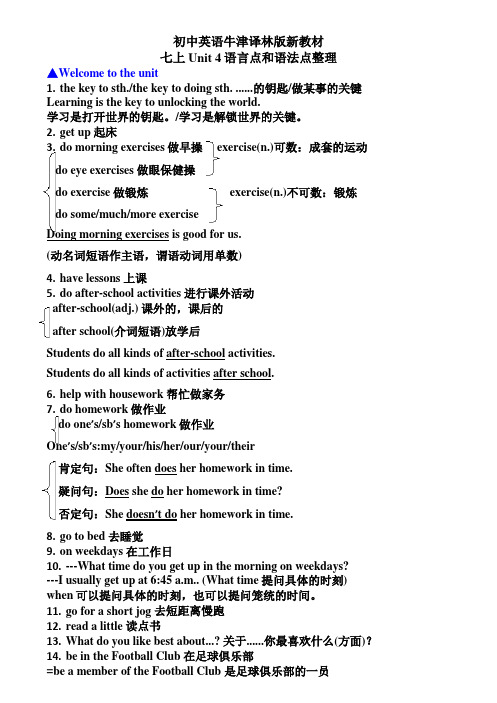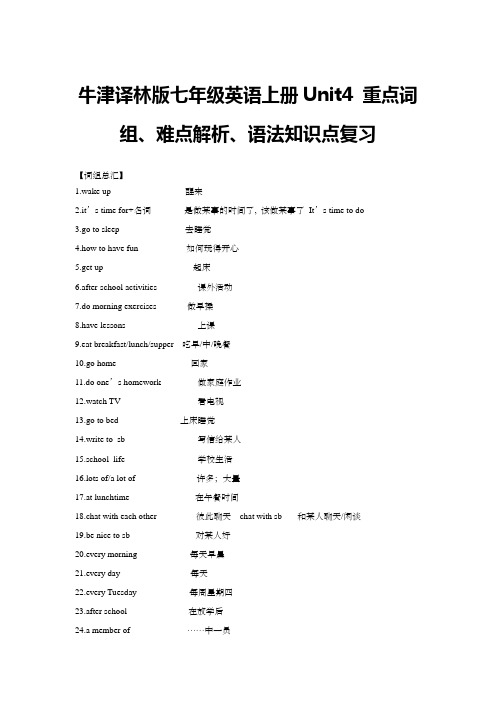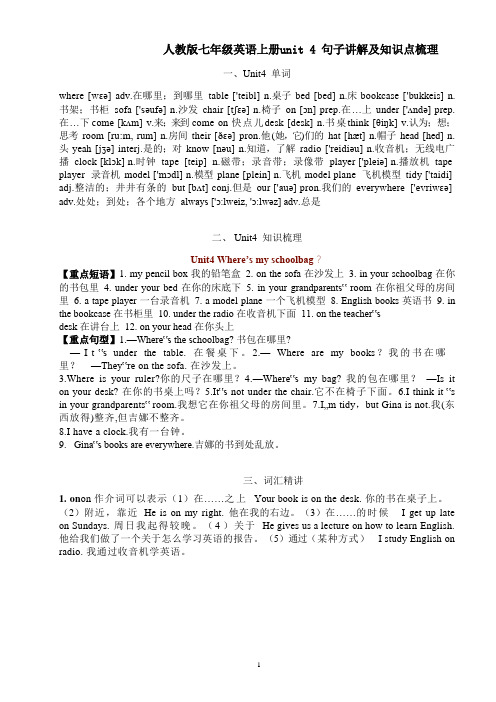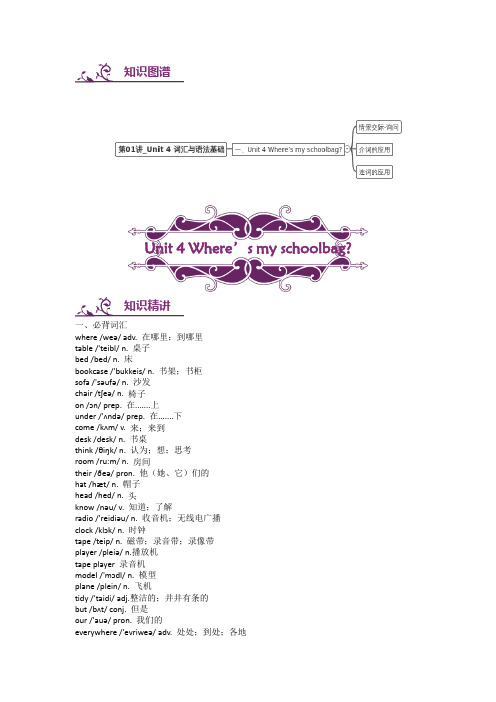七年级上 Unit4复习
七上英语第四单元知识点归纳

第四单元是关于“时间”的内容。
以下是七年级上册英语第四单元的知识点归纳:1. 时间表达:-问时间:What time is it?(现在几点了?)-回答时间:It's + 小时+ 点钟。
例如:It's nine o'clock.(九点钟。
)-问日期:What's the date today?(今天几号?)-回答日期:It's + 月份+ 日。
例如:It's September 15th.(九月十五日。
)2. 一天的时间段:- morning(早上)- afternoon(下午)- evening(晚上)3. 一周的天数:- Monday(星期一)- Tuesday(星期二)- Wednesday(星期三)- Thursday(星期四)- Friday(星期五)- Saturday(星期六)- Sunday(星期日)4. 日常活动和时间:- get up(起床)- have breakfast(吃早餐)- go to school(去学校)- have lunch(吃午饭)- do homework(做作业)- have dinner(吃晚饭)- go to bed(上床睡觉)5. 询问和回答活动发生的时间:- What time do you...?(你什么时间...?)- I... at + 时间。
例如:I get up at seven o'clock.(我七点钟起床。
)6. 表示频率的副词:- always(总是)- usually(通常)- often(经常)- sometimes(有时候)- rarely(很少)- never(从不)7. 词汇扩展:-月份:January(一月)、February(二月)、March(三月)、April(四月)、May(五月)、June(六月)、July(七月)、August(八月)、September (九月)、October(十月)、November(十一月)、December(十二月)-季节:spring(春天)、summer(夏天)、autumn/fall(秋天)、winter (冬天)以上是关于七年级上册英语第四单元的知识点归纳。
Unit4 复习课件 2023-2024学年鲁教版英语七年级上册

我们在海边度假。
We spent our holiday __b_y_____ __th_e____ ___s__e_a____.
那人是坐公共汽车来的。
The man __c_a_m__e__by_____b_u_s___.
他们坐飞机去上海。
They went to Shanghai __b__y_______ ____p__la__n_e___. [来源XXK]
单元重点语法
【复习一般过去时的构成】
1. 含有be动词的一般过去时: (1) 肯定式:__主__语__+__w_a_s_/_w_e_r_e_+_其__他________ I was at home yesterday. (2) 否定式:__主__语__+__w_a_s_/_w_e_r_e_+_n_o_t_+_其__他____ I was not at home yesterday.
I ___f_i_n_d_____a job as __a____ ____g_u_i_d_e.
as作介词的其他用法.
1) 表示好像。如:He dressed as a policeman. 他穿得想个警察。
2) 补充:as +adj(原级)+as as +adv(原级)+as (了解即可)
【拓展】as 的有关短语
Our teacher ___is____ ___s_i_tt_in__g__ ___b_y_______ the window.
【拓展】by的其它意思
(1)乘坐交通工具
如:by bus 乘坐公交车
(2)表时间,不迟于
如:by six 6点前
(3)表手段,方式,意为“通过,靠” 如:He makes a living by teaching. 【练习】
厦门市第一中学初中英语七年级上册Unit 4复习题(含答案)

一、选择题1.—Are Linda's tapes on the desk?—________.They are in the bookcase.A.Yes,they are B.No,they aren'tC.Yes,it is D.No,it isn't B解析:B【详解】句意:——琳达的磁带在书桌上吗?——不,它们不在。
它们在书柜里。
考查一般疑问句的否定回答。
根据一般疑问句中的主语是tapes可知,需要用表示复数含义的代词they来代替,排除C和D;根据答语第二句话They are in the bookcase.可知,磁带在书柜里不在书桌上,需用否定回答,排除A。
故选B。
【点睛】Be动词一般疑问句的基本形式:一般提问:Be+主语+其他部分?肯定回答:Yes,主语+be.否定回答:No,主语+be + not.例句:一般提问:Are you an engineer?肯定回答:Yes,I am.否定回答:No,I'm not.注意:肯定回答Yes,后面的 I am, you are, he is, she is, it is 等不能缩写。
否定回答No,后面可以缩写。
比如:I'm not,you aren't或you're not,he isn't或he's not,she isn't或she's not,it isn't或it's not,we aren't或we're not,they're not或they aren't等。
2.Jack is at work. Please _______ his ID card to him.A.take B.bring C.carry D.need A解析:A【解析】【详解】句意“杰克在上班,请把他的身份证带给他”。
牛津译林版七年级上册(2024)Unit 4 School day 语言点和语法点整理

初中英语牛津译林版新教材七上Unit 4语言点和语法点整理▲Welcome to the unit1.the key to sth./the key to doing sth. ......的钥匙/做某事的关键Learning is the key to unlocking the world.学习是打开世界的钥匙。
/学习是解锁世界的关键。
2.get up 起床3.do morning exercises做早操 exercise(n.)可数:成套的运动 do eye exercises 做眼保健操do exercise 做锻炼 exercise(n.)不可数:锻炼do some/much/more exerciseDoing morning exercises is good for us.(动名词短语作主语,谓语动词用单数)4.have lessons 上课5.do after-school activities 进行课外活动after-school(adj.) 课外的,课后的after school(介词短语)放学后Students do all kinds of after-school activities.Students do all kinds of activities after school.6.help with housework 帮忙做家务7.do homework做作业do one’s/sb’s homework做作业One’s/sb’s:my/your/his/her/our/your/their肯定句:She often does her homework in time.疑问句:Does she do her homework in time?否定句:She doesn’t do her homework in time.8.go to bed 去睡觉9.on weekdays 在工作日10.---What time do you get up in the morning on weekdays?---I usually get up at 6:45 a.m.. (What time提问具体的时刻) when可以提问具体的时刻,也可以提问笼统的时间。
牛津译林版七年级英语上册Unit4-重点词组、难点解析、语法知识点复习

牛津译林版七年级英语上册Unit4 重点词组、难点解析、语法知识点复习【词组总汇】1.wake up 醒来2.it’s time for+名词是做某事的时间了, 该做某事了It’s time to do3.go to sleep 去睡觉4.how to have fun 如何玩得开心5.get up 起床6.after-school activities 课外活动7.do morning exercises 做早操8.have lessons 上课9.eat breakfast/lunch/supper 吃早/中/晚餐10.go home 回家11.do one’s homework 做家庭作业12.watch TV 看电视13.go to bed 上床睡觉14.write to sb 写信给某人15.school life 学校生活16.lots of/a lot of 许多;大量17.at lunchtime 在午餐时间18.chat with each other 彼此聊天chat with sb 和某人聊天/闲谈19.be nice to sb 对某人好20.every morning 每天早晨21.every day 每天22.every Tuesday 每周星期四23.after school 在放学后24.a member of ……中一员25.the Swimming Club 游泳兴趣小组26.have a good time 玩的开心27.email sb 给某人发电子邮件28.play games 玩游戏, 进行比赛29.twice a week 一周两次30.have fun 娱乐,乐趣;开心P.27-3031.listen to the radio 听收音机32.make a model plane 制作模型飞机33.read newspapers 看报read books 看书34.write emails 写邮件35.watch football matches 看球赛36.watch too much TV 看电视太多37.listen to music 听音乐38.listen to the teacher 听老师讲39.walk a dog 遛狗40.a piece of good news 一则好消息41.in the school football team 在学校足球队42.all the time 一直43.know (a lot) about…对……了解(很多)44.read comic books 看连环漫画书45.on the volleyball court 在排球场46.from...to…从……到……47.meet up with sb. 约见某人48.do their homework 做他们的作业49.under a big tree 在大树下50.go to one’s dancing lesson 去上舞蹈课51.have (no) time to do sth. 有(没有)时间做某事52.have a lot of new friends 有许多新朋友53.teach us English 教我们英语54.talk about…谈论关于……55.at home 在家56.say hello to…向……问好P.31-3757.the Class 1,Grade 7 students 七年级一班学生58.go on a trip 旅行, 旅游have one’s trip59.look at the posters 看海报60.more than 多于;超过61.twice a week 一星期两次62.the China Space Museum 中国航空博物馆63.the China Science and Technology Museum 中国科技博物馆64.next Monday 下周一65.each student 每个学生66.thank you for doing sth 为做某事而谢谢你anize the class trip 组织班级旅游68.I would like to+动词原形愿意干某事;想要干某事69.the price for………的价格70.be open/be closed 开着、关着71.look forward to…期盼;盼望72.enjoy…very much 非常喜爱……73.need to do sth 需要做……74.borrow a pen 借一支钢笔75.be busy doing 忙于做某事76.be good for 有益于77.help sb do sth 帮助某人做某事78.get ready for 准备……79.learn more about 更多了解……80.the answer to ………的答案81.the Computer Club 电脑兴趣小组【难点解析】1.Is it time for breakfast? 是吃早餐的时间了吗?it’s time for+名词, “是做某事的时间了, 该做某事了”=it’s time to+动词原形.例如:It’s time for class.是上课的时间了。
人教版七年级英语上册unit 4 句子讲解及知识点梳理

人教版七年级英语上册unit 4 句子讲解及知识点梳理一、Unit4 单词where [wɛə] adv.在哪里;到哪里table ['teibl] n.桌子bed [bed] n.床bookcase ['bukkeis] n. 书架;书柜sofa ['səufə] n.沙发chair [tʃɛə] n.椅子on [ɔn] prep.在…上under ['ʌndə] prep. 在…下come [kʌm] v.来;来到come on 快点儿desk [desk] n.书桌think [θiŋk] v.认为;想;思考room [ru:m, rum] n.房间their [ðɛə] pron.他(她,它)们的hat [hæt] n.帽子head [hed] n. 头yeah [jʒə] interj.是的;对know [nəu] n.知道,了解radio ['reidiəu] n.收音机;无线电广播clock [klɔk] n.时钟tape [teip] n.磁带;录音带;录像带player ['pleiə] n.播放机tape player 录音机model ['mɔdl] n.模型plane [plein] n.飞机model plane 飞机模型tidy ['taidi] adj.整洁的;井井有条的but [bʌt] conj.但是our ['auə] pron.我们的everywhere ['evriwɛə] adv.处处;到处;各个地方always ['ɔ:lweiz, 'ɔ:lwəz] adv.总是二、 Unit4 知识梳理Unit4 Where’s my schoolbag?【重点短语】1. my pencil box 我的铅笔盒 2. on the sofa 在沙发上 3. in your schoolbag 在你的书包里4. under your bed 在你的床底下 5. in your grandparents‟ room 在你祖父母的房间里 6. a tape player 一台录音机7. a model plane 一个飞机模型8. English books 英语书9. in the bookcase 在书柜里10. under the radio 在收音机下面11. on the teacher‟sdesk 在讲台上12. on your head 在你头上【重点句型】1.—Where‟s the schoolbag? 书包在哪里?—I t ‟s under the table. 在餐桌下。
巴蜀中学初中英语七年级上册Unit 4复习题(含答案)

一、选择题1.—Dad,where are my tapes?—They are ________ the box ________ your bed.A.at;on B.in;under C.in;at D.at;in B解析:B【详解】句意:——爸爸,我的磁带在哪里?——它们在你的床底下的箱子里。
考查方位介词。
at表示在小地方或在……旁边;on表示接壤;in表示在大地方或在……里;under表示在……下面。
根据题目,第一个空表示在箱子里用in the box表示,第二个空在你的床底下用under your bed表示,故选B。
【点睛】方位介词用法at表示在小地方或在……旁边;例句:He arrived at the station. / He sits by the river.on表示接壤或在……上面(表面接触);例句:Russia is on the north of China. / Books are on the desk.in表示在大地方或在……里;例句:Jiangsu is in the east of China.to表示在……外(不接壤);例句:Yunnan is to the south of Jiangsu.under表示在……下方(一般指正下方);例句:The box is under the bed.below 表示在……下方(不一定是正下方)例句:There are a lot of fishes below the surface(表面)of the water.above 表示在……上方;例句:Our plane flies above the clouds.over 表示在……上方(一般指正上方);例句:There is a bridge over the river.2.–Where is her ball?--_______.A.It’s on the floor; on the bedB.It’s in the floor, on the dresserC.It’s on the floor; under the chairD.It’s on the floor; in the drawer C解析:C【解析】【详解】句意“-她的球在什么地方?-在地板上,椅子下面”。
人教版七年级上册英语Unit 4知识点梳理及语法讲义(教师版)

七年级上册英语Unit 4知识点与语法精讲精练词汇梳理(一)完成单词梳理:名词:1. table桌子 2. bed 床 3. bookcase 书架;书柜4. sofa 沙发5. chair 椅子6. desk 书桌7. room 房间8. hat 帽子9. head 头10. radio 收音机11. clock 时钟12. tape 磁带;录音带13. player 播放机14. model 模型15. plane 飞机动词:1. come 来;来到 2. think 认为;想;思考 3. know 知道;了解代词:1. their 他(她、它)们的 2. our 我们的介词:1. on 在……上 2. under 在……下副词:1. where 在哪里;到哪里 2. everywhere 处处;到处;各个地方3. always 总是连词:1. but 但是形容词:1. tidy 整洁的;井井有条的感叹词:1. yeah 是的;对(二) 词汇变形小结:1. they (人称代词主格:他/她/它们) — them (人称代词宾格) — their (形容词性物主代词:他/她/它们的) — theirs (名词性物主代词:他/她/它们的)2. tidy (adj. 整洁的) — untidy (反义词:不整洁的)3. radio (n. 收音机) — radios (复数)4. we(人称代词主格:我们) — us (人称代词宾格) — our (形容词性物主代词:我们的) — ours (名词性物主代词:我们的)【练一练】用所给词的适当形式填空1.Look! Those are four beds (bed) in my house.rry and I are Bill’s daughters, so Bill is our (we) father.3.Those old CD players ( player) are very nice.4.Susan and Emma thank their (they) teacher for helping them find the keys.5.Tina comes (come) to the gym and plays sports.6.These rooms (room) are too small.7.Look! Your model plane is (be) on the sofa.8.The Chinese book is his (he).9.Look at my mother’s (mother) room. It’s very clean.10.These are their (they) baseballs.(三) 短语攻关:come on快点儿tape player 磁带播放机model plane飞机模型on the sofa 在沙发上in one’s schoolbag在某人的书包里under one’s bed 在某人的床下面on one’s head在某人的头上teacher’s desk 讲桌pencil box 铅笔盒computer game电脑游戏知识点梳理1. Where are my books? 我的书在哪里?【用法详解】“Where+be动词+主语?”该句型为where引导的特殊疑问句,用来询问“某人或某物在哪里?”。
新目标英语七年级(上)Unit_4知识要点归纳

栏纳
on the sofa在沙发上
in your schoolbag在你的书包里
my tape player我的磁带播放机(录音机)
under the bed在床下
on the desk在桌上
take...to...把……带去……
on the bed在床上
in the bookcase在书柜里
her math book她的数学书
【重难点句子】1.—Where’s my schoolbag?———我的书包在哪里?
—在桌子上。
—It’s on the desk.——
2.—Are your books under the chair?———你的书在椅子下面吗?
—不,不在。
—No,they aren’t.——
3.—Is the baseball on the sofa?———棒球在沙发上吗?
—No,it isn’t.It’s under the chair.——
—不,不在。
它在椅子下面。
4.Please take these things to your elder sister.请把这些东西带给你姐姐。
5.Can you bring some things to school?你能带些东西到学校来吗?
6.I think it’s in your grandparents’room.我想它在你爷爷奶奶的房间里。
33
Copyright©博看网. All Rights Reserved.。
仁爱英语七年级上册u4知识点

仁爱英语七年级上册u4知识点Unit 4: Let's Celebrate!在本单元中,我们将学习关于节日的词汇、单词拼写、听力和阅读技能,以及如何用英语谈论我们喜欢的节日和庆祝活动。
接下来,让我们详细了解下本单元的知识点。
一、新词汇1. celebrate (v.) 庆祝2. ceremony (n.) 典礼3. tradition (n.) 传统4. custom (n.) 风俗5. parade (n.) 游行6. national (adj.) 国家的7. feast (n.) 宴会8. decoration (n.) 装饰品9. costume (n.) 服装10. mask (n.) 面具二、拼写在本单元中,我们将学习一些常用的描述节日活动和庆祝活动的单词。
你需要掌握这些单词的正确拼写。
1. celebrate2. tradition3. parade4. national5. feast6. decoration7. costume三、听力技能在学习英语中,听力技能非常重要。
下面是本单元中的一些听力技能:1. 聆听并理解描述庆祝活动和节日活动的句子。
2. 能够听懂人们在讲述他们喜欢的节日或庆祝活动。
四、阅读技能阅读是英语学习中非常重要的一部分。
本单元中,学生将通过阅读文章和句子来加强他们的英语阅读技能。
1. 阅读与庆祝活动和节日相关的文章,并理解文章中的句子。
2. 理解人物在阐述他们喜欢的节日或庆祝活动时所使用的词汇。
五、谈论节日在学习完本单元的内容后,你将能够用英语描述你喜欢的节日并谈论庆祝活动。
下面是一个简单的范例:I like Christmas. It is my favorite holiday. Every year, my family and I decorate our house with lights and ornaments. We also have a big feast with turkey, ham, and lots of other delicious food. On Christmasmorning, we open presents and sing carols. It is a very special time of year for me.感谢您阅读本文,希望这些知识点能够帮助您更好地学习仁爱英语七年级上册的Unit 4。
[全]人教七年级英语上Unit4考点知识点解析+练习含答案
![[全]人教七年级英语上Unit4考点知识点解析+练习含答案](https://img.taocdn.com/s3/m/99f3ff3bf705cc17552709e3.png)
人教七年级英语上Unit4考点知识点全解析+练习含答案重点词汇解析1.where adv. 在哪里;到哪里【经典例句】Where are you?你在哪?【考点聚焦】where是特殊疑问词,用来引导特殊疑问句。
当我们不知道某东西在什么地方时,常用Where is/are...?来询问。
2.table n. 桌子【经典例句】There is a dog under the table.桌子下面有一条狗。
【考点聚焦】常用词组:at table在吃饭;at the table在桌旁【易混辨析】table与deskdesk表示"桌子"的意思。
指供读书、写字、办公用的桌子,一般带有抽屉。
例如:There are forty desks and chairs in the classroom. 教室里有四十张桌子和椅子。
There are two books on the desk.桌上有两本书。
table 意思是"桌子"。
侧重于指供吃饭、喝茶、游戏或其它用途的桌子,通常没有抽屉。
例如:Our football is under the table. 我们的足球在桌子底下。
Where is the table?桌子在哪儿?1.表示物体的方位,叫方位介词。
,in, on under, behind后面跟名词或名词词组构成介词短语on prep. 在……(紧贴着某物,有接触面)例如:on his desk"在他的书桌上",on the floor"在地板上",on the bed"在床上",on the wall"在墙上"等等。
under prep. 在……下面,例如:under my chair"在我的椅子下面",under the desk"在书桌下面",under kate's bed"在凯特的床下面"等。
+Unit+4单元复习知识点及单元话题作文 人教版七年级英语上册

Unit 4 Where’s my schoolbag?1.谈论物品的位置Where’s+单数物品?It’s+介词短语.Where are+复数物品?They’re +介词短语,1) Where’s the baseball? It’s in the backpack.棒球在哪?在背包里。
2) Where’s my computer game? It’s under the bed.3) Where are your books? They’re on the chair.4) Where are the keys? They’re on the dresser.名词前已有作定语的this, that, my, your, some, any, each, every等代词,则不用冠词。
2.表位置的介词on 在......上(两者相接触)in 在......里under在.....。
下面(正下方)3. I don’t know.我不知道。
4. take sb/sth to+地点:把某人/某物带到某地。
1)把书带到学校take sth to sb把某物带给某人2)把书带给他5. Thanks = Thank you.6. Can you bring some things to school?你能带些东西到学校吗?-bring“带来,拿来”表示从远处带到近处,从别的地方带到说话者的地方。
take“带走,拿走”表示从近处带到远处,从说话者的地方带到别的地方。
1)请给我带块橡皮擦。
2)请把这些书带给你妹妹。
7. some 和any(一些)1) some一般用于肯定句,any用于否定句和疑问句①我需要一些笔记本。
②我没有书。
I don’t have() books.③Do you have ( )books?你有一些书吗?2)在表示请求、建议、征求意见等委婉语气的疑问句中,用some 而不用any。
①Can you bring some things to school?你能带些东西到学校吗?②Would you like ()apples?你想要一些苹果吗?8. on the wall与in the wall(在墙上)二.重点短语及句型1.快点Come on!2.它在你的书桌上吗?Is it on your desk? Yes, it is. /No,it isn’t.3.他们在书包里吗?Are they in the schoolbag?Yes,they are. /No, they aren’t.4.Where's the map? It's in your grandparents' room.地图在哪儿?它在你(外)祖父母的房间里.5.Where are my books? They're on the sofa.我的书在哪儿? 它们在沙发上6.Where's his pencil box? It's in his schoolbag. 他的铅笔盒在哪里?它在他的书包里。
人教版七年级上册英语Unit4 同步复习(含答案)

知识图谱Unit 4 Where’s my schoolbag?知识精讲一、必背词汇where /weə/ adv. 在哪里;到哪里table /'teibl/ n. 桌子bed /bed/ n. 床bookcase /'bukkeis/ n. 书架;书柜sofa /'səufə/ n. 沙发chair /tʃeə/ n. 椅子on /ɔn/ prep. 在.......上under /'ʌndə/ prep. 在.......下come /kʌm/ v. 来;来到desk /desk/ n. 书桌think /θiŋk/ n. 认为;想;思考room /ru:m/ n. 房间their /ðeə/ pron. 他(她、它)们的hat /hæt/ n. 帽子head /hed/ n. 头know /nəu/ v. 知道;了解radio /'reidiəu/ n. 收音机;无线电广播clock /klɔk/ n. 时钟tape /teip/ n. 磁带;录音带;录像带player /pleiə/ n.播放机tape player 录音机model /'mɔdl/ n. 模型plane /plein/ n. 飞机tidy /'taidi/ adj.整洁的;井井有条的but /bʌt/ conj. 但是our /'auə/ pron. 我们的everywhere /'evriweə/ adv. 处处;到处;各地always /'ɔ:lweiz/ adv. 总是二、重点词汇1. think verb & noun /θɪŋk/1). verb. to believe something or have an opinion or idea 相信;觉得;思考例句:I don't think Emma will get the job.我认为埃玛不会获得这份工作。
(完整版)人教版七年级上册英语知识点全第四单元unit4知识点

(完整版)⼈教版七年级上册英语知识点全第四单元unit4知识点Unit4重点词汇:where、table、bed、bookcase、sofa、chair、on、under、come、desk、tidy、always...1、重点短语:on the sofa 在沙发上 on the table 在桌上on your head 在你的头上 under the chair在椅⼦下under the bed 在床下 under the table 在桌下in your schoolbag 在你的书包⾥ in the bookcase 在书柜⾥in your grandparents’ room 在你爷爷奶奶的房间⾥come on 快点2、where引导的特殊疑问句,⽤于询问“某⼈或某物在哪⾥”,若谓语动词为be动词,其结构为“Where + be + 主语?”,be动词要与后⾯的主语保持⼀致。
其答语,⽤“主语+be+表⽰地点的的介词短语”为避免重复,句中的主语⼀般⽤代词代替。
----Where is/are...?----It’s/They’re on /in/under...----Where is my English book?----It’s on the desk.1)My clock is on the table?(就画线部分提问)________ ________ your clock?2)你的爸爸在哪?(翻译下列句⼦)______________________________________________3、on 在……的上⾯(接触) on the sofa/desk/table/bed on the tree 在树上(本⾝固有的)in 在……的⾥⾯ in your schoolbag/room in the tree 在树上(外来的事物)under 在……的下⾯(正下⽅) under your bed/desk若表⽰“某物在某地”则⽤“物 + be + 介词短语”结构。
Unit4Topic3复习讲义英语七年级上册

七上Unit 4Topic 3 What time is it now?Section A1.What time is it now? 现在几点了?2.Do you have any time tomorrow? 你明天有时间吗?any 一些(否定句/疑问句)some 一些(肯定句)3.What’s up? 什么事?4.We want to go to the zoo. Would you like to go with us?我们想要去动物园。
你想要和我们一起去吗?want to do sth= would like to do sth 想要做某事go to the zoo 去动物园5.good idea 好主意6.Can we see pandas there? 我们能在那看见熊猫吗?7.Let’s meet at 9 o’clock at my home. 让我们在我家九点见面。
let sb do sth 让某人做某事at+时间点8.对时间进行提问:What time is it, please? / What’s the time, please?回答:It’s one o’clock. 一点9.时间的表达:整点:It’s one o’clock./ It’s one. 一点It’s five past two. /It’s two o five. 两点零五It’s a quarter past three./ It’s three fifteen. 三点十五It’s half past four./ It’s four thirty. 四点半It’s twentythree to six./ It’s five thirtyseven. 五点三十七It’s a quarter to eight./ It’s seven fortyfive. 七点四十五1)所有的时间都可以用“小时+分钟”直接读2)如果表述时间在半小时以内:分钟+past+小时3)如果表述时间在半小时以外:(相差的)分钟+to+(下一)小时4)表述时间恰好为半小时:half past +小时5)表述时间的分钟和15有关:三种表达方式9:15 nine fifteen/ fifteen past nine/ a quarter past nine3:45 three fortyfive/ fifteen to four/ a quarter to four6)整点表达:It’s one o’clock./ It’s one. 一点Section B1.在某人的家:at one’s home2.It’s time to go to the zoo. 是去动物园的时间了。
(人教版) 2024七年级上册Unit 4 知识点梳理

(人教版) 2024七年级上册Unit 4 知识点梳理Section A1a 掌握不同学科的表达拓展:1.history 历史a long history 悠久的历史in history 历史上2.English (国家) England1c 拓展1.hard =difficult (反义词) easy2.fun名词have fun doing sth. 玩得开心........eful 有用的a useful book (u字母的发音为辅音音素)4.exciting 令人兴奋的(用于说明事物) It’s ______________(令人兴奋的电影)excited 兴奋的(用于说明人) I’m ____________(兴奋的听到) the good news.5.boring 令人兴奋的(用于说明事物) It’s ______________(令人乏味的电影)bored 兴奋的(用于说明人) The trip makes me____________(觉得无聊)Pronunciation1 策略:双元音是作为一个音节,用一次呼气发出来的两个元音的连缀。
双元音的两个成分中只有第一个读得比较重,长和清晰,第二个则要读得比较轻、短和含糊。
2.wake him up 唤醒他You're going to __________(迟到).2a 1.What's our ____________(下节课)?2.It's __________(interest) to learn about the past.(了解过去)3.past ①[名词] 过去;过去的事情in the past 在过去②[形容词] 过去的in past years 在过去的岁月③[介词]晚于; 在...…之后half past two 2点半4. It's useful, and my English teacher is _________(real) nice.5.I like all the subjects, ________ my favourite is maths.6.I'm good ____________ numbers. 我擅长和数字打交道。
初中英语七年级上册Unit4

七上Unit4Seasons1.watch v.观看watch sb.do sth.“看到某人做某事”,强调动作经常发生,或看到动作发生的全过程。
watch sb.doing sth.“看到某人正在做某事”,强调动作正在进行。
注:有类似用法的词还有hear,see.watch:侧重“观看”,强调看活动的、非静止的画面。
watch TVlook:指有意识的去看,强调“看”的动作过程,常与at连用。
look at the blackboard看黑板2.kick v.踢kick at朝...踢kick down踢倒kick over踢翻3.start v.开始;着手start to do sth.=start doing sth.开始做某事注意:start后可跟动词不定式或动名词做宾语。
但当物作主语时、start本身是动词-ing形式、start后接的动词为表示心理活动的动词时,只能用start to do sth.4.everything pron.所有事物;一切在句中做主语,宾语或表语。
做主语时,谓语动词用单数形式。
everything else=all the other things其他所有事物5.take a trip去旅行=have a triptake/have a look看一看take/have a walk散步take/have a rest休息一下trip:指短距离的出行,也含有已回到出发地的意思。
journey:指远距离的陆地旅行,它没有回到原出发地的意思,也可指从一个地点到另一个地点所花费的时间或所走的距离。
voyage/´vɔɪɪdʒ/:多指海上旅行。
6.snowy adj.下雪多的snow n.[U]雪n.[C]一场雪v.下雪描述天气状况的形容词:rain/rainy wind/windy(风)cloud/cloudy(多云)sun/sunny7.spend v.花(时间);度过spend的主语是“人”花时间spend time with sb.和某人度过时光sb.spend(s)some time on sth.某人花费多长时间在某事上sb.spend(s)some time(in)doing sth.某人花费多长时间做某事(in常省略)花钱sb.spend(s)some money on sth.某人买某物花费多少钱sb.spend(s)some money(in)doing sth.某人做某事花费多少钱(in常省略)“sb.spend(s)some time(in)doing sth.”常与“It take sb.some time to do sth.”句型进行同义转换。
新人教版七年级(上册)Unit 4 知识点总结

新人教版七年级(上册)Unit 4 知识点总结nit 4 My Favourite Subject一、短语归纳1. the importance of ……..的重要性2. favourite subject 最喜欢的学科3. wake up 醒来4. be late for 迟到5. come on 快点6. next class 下一节课7. learn about 了解;学习;知道8. be good with 灵巧的;善于应付…的9. help sb with 帮助某人做(某事)10. look at sth 看某物11. let sb do sth 让:果人做某事12. listen to 听;倾听13. be good at 擅长14. walk to school 步行去卜:学15. work hard 努力工作16. make sb /sth+adj. 计果人 /物17. make sb do sth 让某人做果事18. on that day 在那天19. the same as 与……一样20. all kinds of 各种各样的21. want to be 想要成为22. in the future 将来;未来23. work out 计算出;解决24. in class 课堂上25. feel like 感觉像26. in one's life 在某人的生活中二、必背重点句型1. 谈论最喜欢的学科:——What's your favourite subject?你最喜欢的学科是什么?——My favourite subject is English.我最喜欢的学科是英语。
2. 询问原因并给出理由:-——Why do you like it?你为什么喜欢它?——It's interesting to learn about the past. 了解过去是有趣的。
- 1、下载文档前请自行甄别文档内容的完整性,平台不提供额外的编辑、内容补充、找答案等附加服务。
- 2、"仅部分预览"的文档,不可在线预览部分如存在完整性等问题,可反馈申请退款(可完整预览的文档不适用该条件!)。
- 3、如文档侵犯您的权益,请联系客服反馈,我们会尽快为您处理(人工客服工作时间:9:00-18:30)。
6.你在开玩笑吗?(kid) Are you kidding?
7.你觉得这件黄色的裙子怎么样?(what do you think of…? How do you like…?) what do you think of this yellow skirt? How do you like this yellow skit? 8. 你这周日有空吗?(be free) Are you free this Sunday? 9.什么事/怎么啦? What’s up?
3. How much和 How many
How much+n.(不可数名词) ;How many+n.(可数名 词复数);都是用来询问数量的。 练习 1. _________ How much water do you want? 2. ________bread would you like to buy? How much 3. _________hamburgers would you like? How many How many 5.__________classes do you have on sunday?
12.让我们九点在我家见面。(let sb. do …) Let’s meet at 9 o’clock at my home. 14.看这些猴子。(look at) Look at these monkeys.
15.回家的时间到了。( it is time to do… )
It is time to go home. 16.我找不到回家的路了。 I can’t find my way home. 17.你真好! It is very kind of you! 18.我们到了。 Here we are.
2. anything 和 someting
anything,something 都可以翻译成“一些东西/事 情”,区别在于anyting 用于否定句和一般疑问 句中;something用于肯定句但有时候也用于渴望 得到对方肯定回答的一般疑问句中。 练习 something to tell you. 1. I have_________ 2. Do you have ________to drink? anything 3. They don’t have_________to eat. anything 5.Would you like __________to eat? something
do one’s homework 18.没有时间 have no time 28.在家 at home/ be in
19.去钓鱼
_____________________
go fishing
29.谢谢某人某事
thank sb. for sth.
20.去购物
___________
go shopping
去西山野炊怎么样?(what/how about)
What about going to the…?
10.你想要去西山野炊吗?(go to…for a picnic) Would you like to go to the West Hill for a picnic? Do you want to… 11.我必需/不得不去取水。(have to+V原形) We have to get some water.
be free 1.为某人买某物___________ 9.有空的________ try on 2.试穿___________ think about 3.考虑__________ buy sth for sb. go for a picnic 10.去野炊_________
buy sb. sth.
1.我可以为你做些什么吗?
What can I do for you? 2.我想要为我女儿买一些衣服。(buy sth. for sb.) I want to buy some clothes for my daughter. 3.Maria试穿那件外套。(try on) Maria tries on the coat. 4.这件衣服穿在你身上看起来不错。(look+adj.,on) This coat looks nice on you. 5.我将会买下它。(take) I will take it.
21.叫/要求某人做某事
ask sb. to do sth. 22.打电话给某人___________________ call sb. _
_____________________
30.如此聪明 so clever
23.会某人电话
_____________________
call sb. back
(这里除了11,12,13,15,18特殊变化以外,14,16,17,19是在个位 数的基础上加teen)
C.从20-99
整十中除twenty,thirty,forty,fifty,eighty特殊变化以外, sixty,seventy,ninety都是在个位数的基础上加ty. 几十几的表 达是在几十和个位之间加上连字符。如21 twenty-one 85 eighty-five
复习
七年级上 Unit4
授课老师:薛文芳 1. 掌握重点词汇,句子。
• 2. 词语辨析: any 和 some, anything 和something How many 和How much
• 3.懂得购物用语,表达数量,电话用语,提出建 议,谈论时间和日常活动。
语法3:电话英语 ① Who is this/that? This is…(speaking) ② May I speak to…? ③ She isn’t in/at home. ④ Could you ask her/him to call me back?
24.在回家的路上 on the way home
_____________________
25.在去„的路上 on the way to…
_____________________
26.随身携带„
_____________________
take sth. with sb.
根据所给提示翻译下面句子
D.百位数
整百的表达法,直接在hundred前加数字:two hundred, thirteen hundred ; 百位与十位间用and连接:101 one hundred and one, 359 three hundred and fifty-nine
语法2:时间的表达法
① 顺读法:先小时,后分钟。按顺序念,无需连接词。 ②逆读法:先分钟后小时。用past, to 连接。
11.去„野炊 go …for a picnic
13.去某地
tell sb. about sth.
a kilo of apples 12.告诉某人有3关某事 4.一千克的苹果_________ a bag of rice 5.一袋的米_________ go to… six bottles of milk唱些歌 sing some songs 6.六瓶的牛奶__________14.
◆当分钟小于等于30时,用past 连接。 3:10 ten past three 4:15 fifteen past four / a quarter past four 9:30 thirty past nine / a half past nine ◆当分钟大于30时,用to连接。(分钟用60减,时钟加1) 7:40 twenty to eight 11:55 five to twelve 8:45 fifteen to nine / a quarter to nine
1. any 和 some
any,some 都可以翻译成“一些”,区别在于any 用于否定句和疑问句中;some用于肯定句但有时 候也用于征求对方意见的疑问句中(would you like some…? What about some…?)。 练习 1. I have_____ some good friends in my class. 2. Do you have _____some books? any 3. They don’t have_____time. any 5.Would you like some _____hamburgers to eat?
语法1:一百以内基数词的表达
A.从1-10 one,two,three,four,five,six,seven,eight,ten. B.从11-19 eleven,twelve,thirteen,fourteen,fifteen, sixteen,seventeen,eighteen,nineteen
I two tins of cock 7.两听可乐__________ 15.放风筝 fly kites
a glass of juice 16.取水 take some water 8.一杯果汁___________________
17.不得不做„__________ have to do… 27.做某人的家庭作业
